The press needs its own street, the way traders still have Wall Street. A tribe needs a common territory, writes Joe Lauria.
By Joe Lauria
in London
Special to Consortium News
For reasons that will probably never be explained, the judges in the Julian Assange hearing last week decided to limit remote access to reporters covering the case only to those physically on English or Welsh soil.
Accredited journalists anywhere in the world were given remote video access to cover both Assange’s September 2020 extradition hearing and the 2021 U.S. appeal in the High Court. This is how Consortium News covered those two court appearances.
But this time if you weren’t in England or Wales (in other words within the High Court’s jurisdiction) you couldn’t cover the hearing. That shut out reporters in Australia and the U.S. who have a special interest in the case.
Fortunately Consortium News had long planned to be in London for the hearing.
My hotel was three blocks from the Royal Courts of Justice, a five-minute walk away, where the Strand turns into Fleet Street. As I approached the courthouse on Tuesday morning at around 8:45 for Day One, Jeremy Corbyn was addressing the crowd.
Nearly 1,000 Assange supporters flooded the street, causing a double wall of yellow-vested cops to open a path into and out of the court.
I walked that same route out of court onto the Strand and the emotion was powerful. https://t.co/akudRzZ1VG
— Joe Lauria (@unjoe) February 22, 2024
Courtroom 5
There is no smaller courtroom in the Royal Courts of Justice than Courtroom 5. After waiting outside in the corridor for more than an hour some were let in, a few at a time. It wasn’t sure there’d be room for everyone. There wasn’t.
I was in the last batch admitted with no apparent seats left in a wood-paneled courtroom with just seven rows of 14 seats each. At the end of the row where I stood sat Clare Daly, the firebrand Irish MEP, a fierce defender of people’s rights and critic of NATO and the U.S. She tried to squeeze in to her left to make room for me, but it wasn’t possible.
I was then pointed to a seat at the end of a long wooden table directly below the barristers’ lecterns, immediately in front of the clerks, with Justice Jeremy Johnson and Dame Victoria Sharp perched above, looking down their noses at us, a mere five meters away.
Fixed in the long oak desk at which I sat with other reporters were worn, brass-lined holes, where long ago ancestors of our dwindling tribe dipped their nibs in bottles of ink.
We were so near to the barristers behind us that on the second day, a flustered Clair Dobbin KC for the prosecution fumbled her papers after being asked a question from the bench, and in the process knocked over a glass of water. It dribbled down the back of Chris Hedges, who sat next to me.
Bare-chested in the Bear Garden?
Being on the road for several weeks before arriving in London to cover the case I was left with one clean shirt in my suitcase, a black t-shirt I had never worn before.
Across the front in small, white lettering was written: “I’m With WikiLeaks.” I turned the shirt inside out and went to the courthouse Wednesday morning wearing it under a green jacket that I did not remove as I went through the metal detector.
However in the afternoon for some reason I removed the green jacket. The security guard wanted to know what was on my shirt. I told him there was nothing there.
“Your shirt is inside out,” he said. “Let me see what’s on it.”
I lifted it up and and he saw the writing.
“That’s why I turned it inside out,” I told him.
“That’s protest material!” he declared.
Worried they would not let me in, I ripped the shirt off and threw it on the table. For a few seconds I was totally naked from the waist up in the middle of the Great Hall in the Royal Courts of Justice on The Strand in London.
I grabbed my green jacket and buttoned it to my neck.
Perhaps it would have been more appropriate to be bare-chested in the Bear Garden, a large room on an upper floor, which took its name from the 16th Century Bear Garden, a bear-baiting ring in Southwark just across the Thames on the south bank.
In this room, attorneys for plaintiffs and defendants used to meet before entering court. Their interactions often broke out into arguments reminiscent of the bear fights.
The entire 1882 building has the appearance inside and out of a cathedral in the Victorian Gothic Revival style, replete with statues of Jesus and Moses. It cost under £1 million, including £70,000 for the interior oak work, including the paneled walls, bookcases, benches and desks inside Courtroom 5.
Fleet Street
The Royal Courts of Justice stand on the eastern end of the Strand, a major thoroughfare that begins at Trafalgar Square and runs into the City of London, just a block from the courthouse, where its name changes to Fleet Street.
An important Roman and medieval road, the street, named after the nearby River Fleet, began as a center of printing and publishing in 1500.
In 1702, London’s first daily newspaper, the Daily Currant, was published in Fleet Street. The repeal of a duty on paper in 1861 led to an explosion of national titles, nearly all of them published in the street.
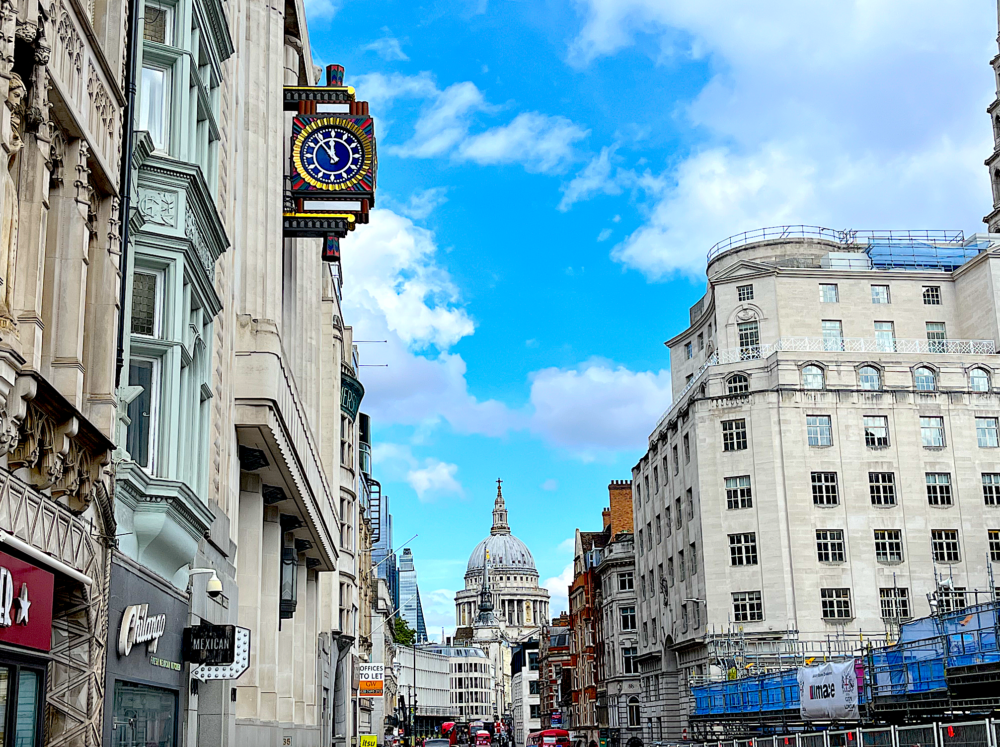
Clock from the former Daily Telegraph Building on Fleet Street looking towards St. Paul’s Cathedral. (Joe Lauria)
By 1900 there were dozens of publications located there, when Fleet Street became synonymous with journalism.
Then came Rupert Murdoch. In 1986 he moved The Times and The Sun out of the street to Wapping to break the print union. It led to violent clashes, but Murdoch succeeded in destroying Fleet Street as the nucleus of the press.
The exodus began and the common home of journalism was destroyed. Newspapers — and their reporters and editors — were scattered throughout London.
The press needs its own street, the way traders still have Wall Street. A tribe needs a common territory. It fostered a camaraderie even amongst fiercely competitive journalists. The street gave the profession the aura of a herd apart from society.
The flight from Fleet Street heralded a dissolution of the press having a unique, if not truly independent, role in society as outsiders on their own turf, given license to critique everyone else.
Newspaper culture, nurtured in the pubs, in the neighboring newsrooms and in the courthouse down the street was broken up. The press, as a unique institution — one of society’s estates — was on its way to decline if not ruin.
New York’s Press District
New York City had its Printer’s Row, opposite City Hall, with all the major dailies (there were as many as 20) in the same and nearby streets. A statue of the printer Benjamin Franklin still stands at the row’s entrance on Printing House Square.
Those newspapers eventually left Printers’ Row too. The New York Times building is now Pace University. The Tribune Building, now gone, was the second tallest building in the city when it was completed in 1875.
The New York World Building, with Joseph Pulitzer’s office in a copper dome at top, was the tallest (in the world) when it was completed in 1890. It was destroyed by New York master planner Robert Moses in 1955 to make way for an expanded Brooklyn Bridge entrance.
The consolidation of corporate ownership, which has shut down scores of newspapers and hemorrhaged thousands of jobs, began in earnest around the time Murdoch led the flight from Fleet Street.
The few newspaper jobs left have become largely casual. Like in academia with adjunct positions, freelancing has become the norm — with staff jobs, like tenure, disappearing.
The competition for the crumbs has further eroded the comradeship, the sense of belonging to a special part of society with its unique power to hold the powerful to account.
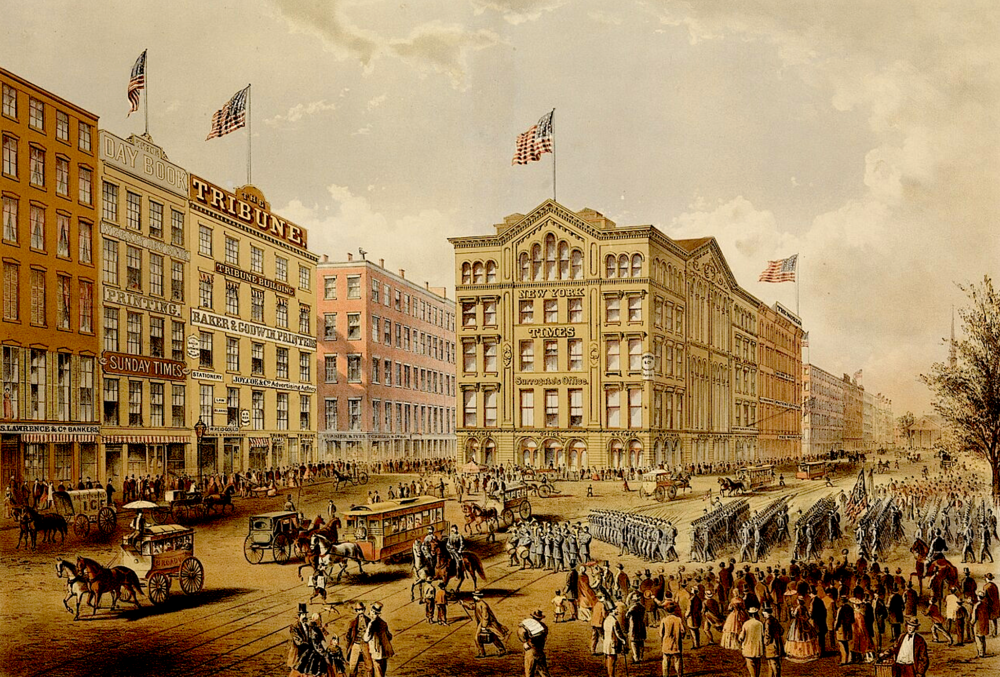
Printing House Square, New York, 1866. Headquarters of The New York Times, The Tribune, The Sun, The World and other newspapers. (Edward W. C. Arnold Collection of New York Prints, Maps and Pictures, 1954)
This erosion of the press’ special status is reflected in its response to the Assange case.
While there have been sporadic intellectual acknowledgements of the threat to press freedom that the prosecution poses, such as occasional editorials and the joint letter sent to the Biden Department of Justice asking to drop the case, there is no passion to defend Assange.
There is nothing resembling the newspaper campaigns of the days when reporters from competing newspapers bumped into each other on Fleet Street.
With our limited resources, this is what we’ve attempted at Consortium News — an old-fashioned, factually-reported, newspaper campaign to right a great injustice.
Joe Lauria is editor-in-chief of Consortium News and a former U.N. correspondent for The Wall Street Journal, Boston Globe, and other newspapers, including The Montreal Gazette, the London Daily Mail and The Star of Johannesburg. He was an investigative reporter for the Sunday Times of London, a financial reporter for Bloomberg News and began his professional work as a 19-year old stringer for The New York Times. He is the author of two books, A Political Odyssey, with Sen. Mike Gravel, foreword by Daniel Ellsberg; and How I Lost By Hillary Clinton, foreword by Julian Assange. He can be reached at joelauria@consortiumnews.com and followed on Twitter @unjoe

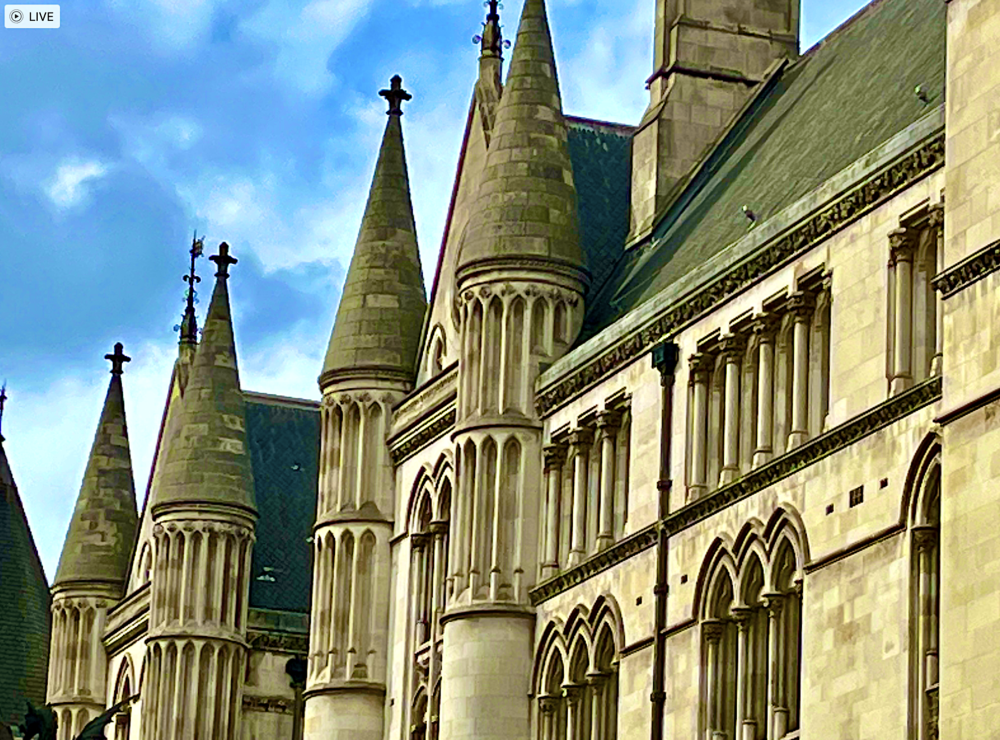


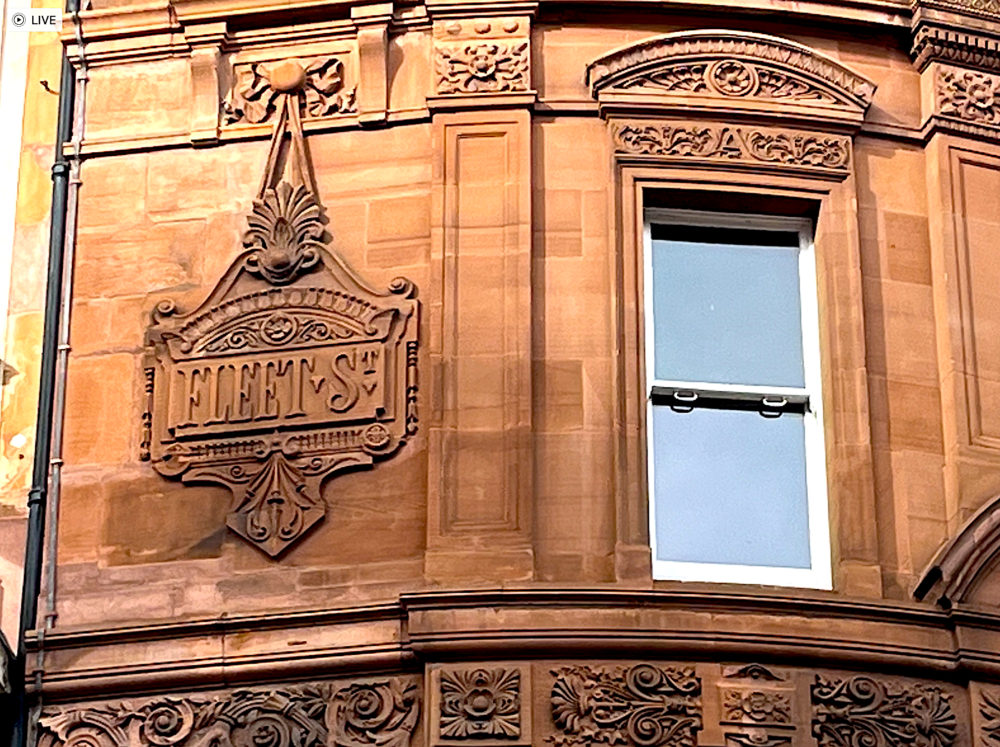
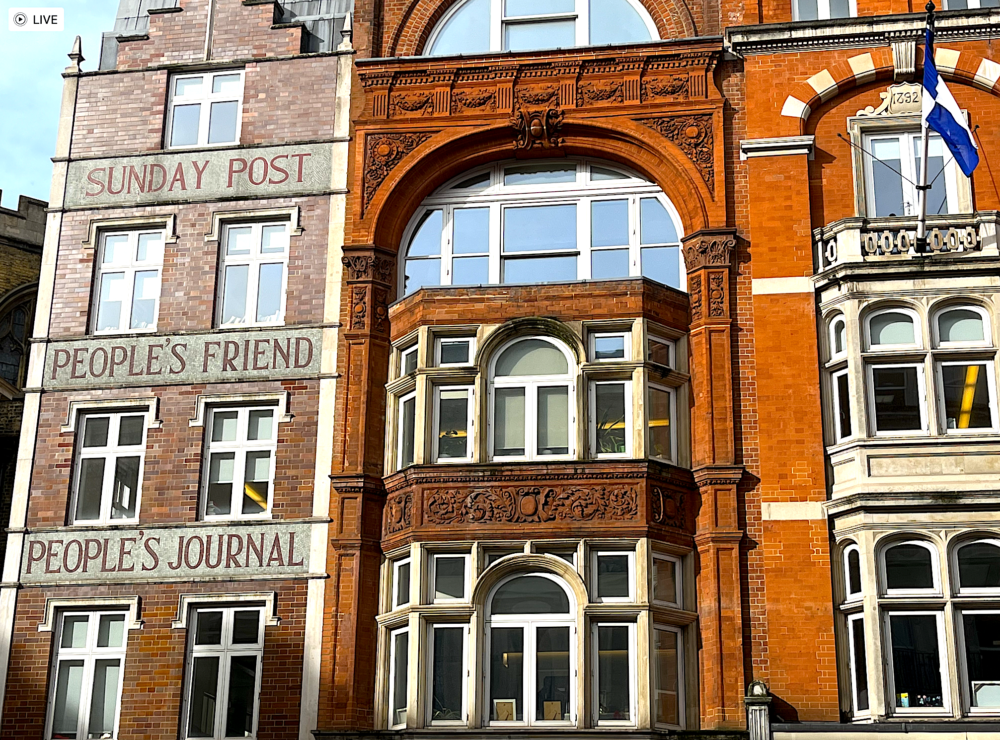
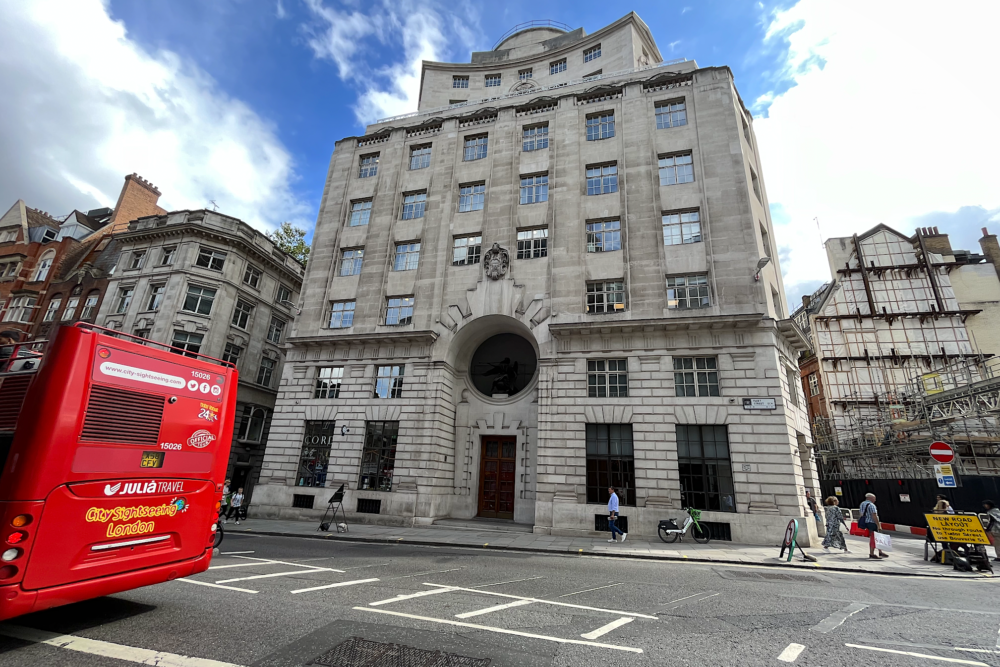
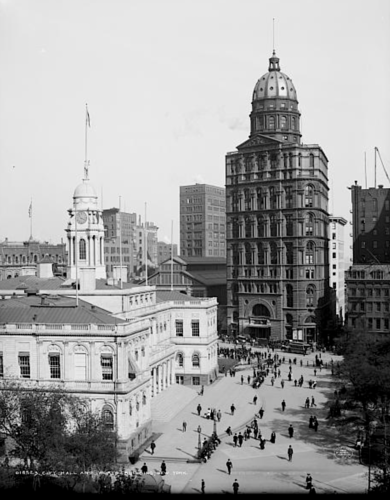
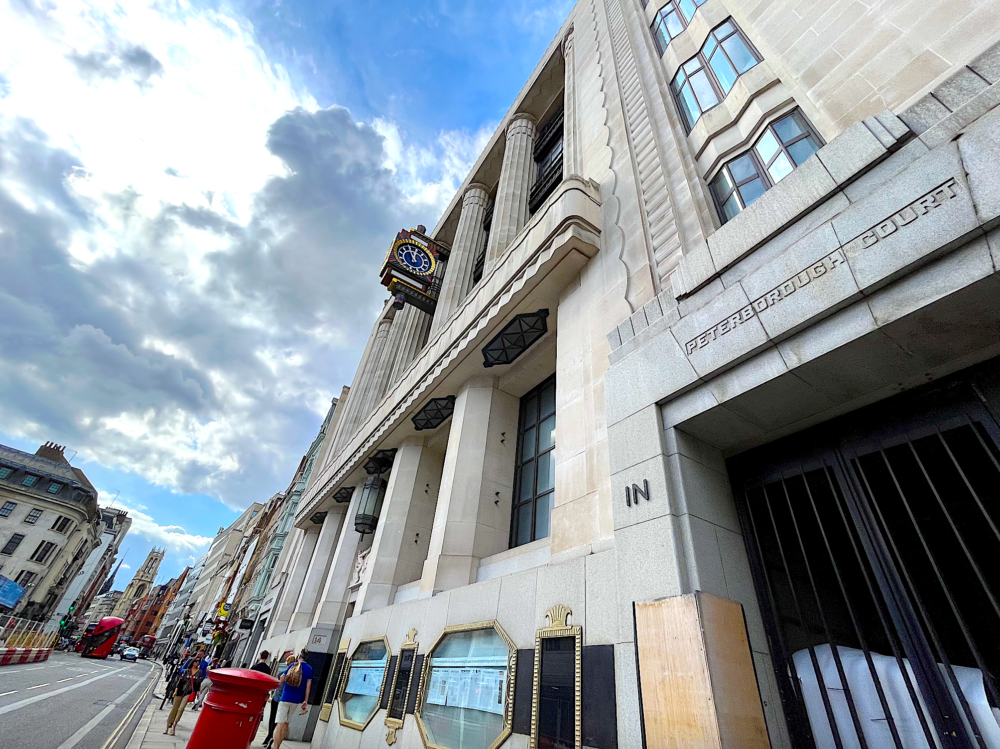
Joe Lauria’s personal travelogue on important bygone newspaper architecture!
Thank you so much for this. Most dispiriting about the slavish devotion of “journalism” to government seems to me the unquestioning acceptance of it by almost everyone I know. Please keep shining the light, Mr. Lauria.
Indeed the press needs “its own street… a common territory” for self-defense as well as to foster camaraderie. That may not be a building, in an era when the fundamental defense is in courts or (far better) countries unconnected with the controversial issues. But the camaraderie may be sustained in a community of those concerned with truth and its discovery and reporting, perhaps certain universities.
I hope that my slowly-developing Congress Of Debate (CongressOfDebate dotcom) will provide such physical community for its administration and trustees, as well as the online community of commenters, discussion groups, and debate teams. When organized as a group, the choice and monitoring of administrators is as important to the defense aspect as the location.
Is the website congress of debate dot com live and available at this time? I can’t find it.
Yes, the name is CongressOfDebate,com. The free book download on that page explains the purposes, operations, and future. The discussion groups are not operational yet.
Excellent Joe, I didn’t know any of that. Its so important that we know and honor our history–even the uglier aspects of it.
And I agree with JonT–the scene in the courtroom & t-shirt is like a Monty Python sketch.–choice!
The Fourth Estate sprang up from revolutions in the US and France and shaped public opinion for 200 years.
The Telecommunications Act of 1996 (and loss of advertising to Google and Meta) was its death rattle. Obama put a spike through its heart with the abolition (“modernization”) of US anti-domestic propaganda law (the Smith Mundt Act) and the Countering Foreign Propaganda and Disinformation Act of 2016, spawned by Russiagate, an inevitable resort of the Patriot Act (which Biden brags he wrote). The old legacy MSM have become State Media, LEGALLY, to disseminate Official Narratives from the State Department and CIA (who seem to have a work-around against domestic interference).
While Joe Lauria’s nostalgia for REAL journalism is shared by most of us, it’s probably best that alternative media are scattered geographically, making eradication by the State more difficult. State Media takes excellent care of their mouth-pieces for the Establishment, many with exorbitant salaries and ‘powerful’ careers. But they are now an arm of the federal government and can say nothing untoward about the Regime. They are the Press in name only.
Though independent media may be scattered geographically, technology has facilitated new forms of censorship, such as the Twitter files exposed.
The term “fourth estate” to describe the press was first used in 1771, according to Wikipedia: ”
Oxford English Dictionary attributes, (“without confirmation”) the origin of the term to Edmund Burke, who may have used it in a British parliamentary debate of 19–20 February 1771, on the opening up of press reporting of the House of Commons of Great Britain. Historian Thomas Carlyle reported the phrase in his account of the night’s proceedings, published in 1840, attributing it to Burke.”
3.4.24 “For reasons that will probably never be explained, the judges in the Julian Assange hearing last week decided to limit remote access to reporters covering the case only to those physically on English or Welsh soil.” Joe Lauria
Imo, by design, the powers’ that be “Control over Communications.”
“I was in the last batch admitted with no apparent seats left in a wood-paneled courtroom with just seven rows of 14 seats each. At the end of the row where I stood sat Clare Daly.” Joe Lauria
… “of all the people on the planet, expected to be @ the Royal Courts of Justice, was the fearless, fierce, Irish MEP, CLARE DALY; and, She’s trying to make room for Joe Lauria!!! BOOM! BOOM! BOOM!!!
…… * “CLARE DALY’S on Joe Lauria’s, right; Chris Hedges, is on his left,” 7 rows/14 seats; “taken;” &, Chris Hedges & Joe Lauria score a seat @ the table! Joe Lauria, had to *“feel lucky” that day. “No Professor Doom’s gonna stand in the way;” i.e., Claire Dobbins KC aka “Nervous Nellie,” Counsel for the United States v Assange, knocks over a glass of water, that “dribbled down the back of Chris Hedges.” WHERE is Mr. Fish & his canvas?!?
Joe Lauria oughta “flip a coin, he’s a winner either way;” even after losing his shirt! i.e., “at Consortium News — an old-fashioned, factually-reported, newspaper campaign to right a great injustice;” (“We” sincerely appreciate CN, Joe Lauria)!
…… “The press needs its own street, the way traders still have Wall Street. A tribe needs a common territory. It fostered a camaraderie even amongst fiercely competitive journalists. The street gave the profession the aura of a herd apart from society.” Joe Lauria
…… “The street gave the profession the aura of a herd apart from society.” Joe Lauria
For the other “Win!” What is an “Esprit de Corps?!?”
…….. “Espirit de corps is a feeling of loyalty and pride that is shared by the members of a group who consider themselves to be [DIFFERENT] different from other people in some [SPECIAL] way.”
NO Doubt, Joe Lauria, Consortium News rocks an “Espirit de Corps,” a shared purpose. It’s universal. It’s “GOLDEN!” TY. * “I Feel Lucky,” Mary Chapin Carpenter.
“Keep It Lit!”
Murdoch Corrupted the UK`s “Main Street Media” into the Cameron/ Metropolitan Police/ Press
Establishment Cesspit. Phone Hacking was the Tip of the Iceberg.
A very moving story, Joe. Thank you.
I know there was a time (I can remember it) when the NYT was not the obvious mouthpiece for the state that it is now, but do you think it was ever really an independent voice?
No as the article states.
Surely there have existed within the press independent voices with substantial circulation (the “Appeal to Reason” for example). I was just wondering whether the NYT had ever had a similar degree of independence.
Indpendence was clearly displayed by the NYT and other papers during the Pentagon Papers affair.
Thank You Joe
This was a fascinating and dispiriting read, filling in the story of the presses decline into near irrelevance.
Thank you, CN and Joe Lauria! Thank you, for the consistently excellent coverage of this case and for never allowing Assange to disappear.
I’m overwhelmed by your article, Joe Lauria.
Perhaps the most powerful, touching, heartbreaking article about what has happened to us all at the hands of the elite who viciously destroy what once was.
Robert Parry would be proud of you for your staunch protection of his lifework – honest, respectful, chivalrous defense of public truth to protect the intentionally isolated victims from powerful cliques of elite charlatans.
To protect the comradeship of your brethren from those creatures who “look down their noses” at us all.
Being ‘overwhelmed ‘ is exactly how I feel after reading this. I am staggered about the fact that Mr. Lauria actually had to remove a back to front shirt! In the Royal Court of (so called) Justice! If Monty Python had come up with this idea for a sketch on one of their shows, people would have said “how funny, thank goodness that this sort of thing never actually happens…” Keep up the good work CN.
One of your very best, Joe. Yes, Bob Parry would love it, too.
Keep up your very important work CN! We need you!!
The insufferable bullying to remove your wikileaks shirt, with its “protest” invisible, shows their desperation. (Increasing desperation; the numbers grow.) Good for you, keeping your cool despite all this. Thank you. This writing is an unusual perspective and a significant rallying call.